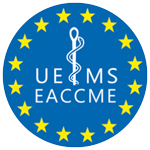 This training is accredited by EACCME with 9 CME credits
This training is accredited by EACCME with 9 CME credits Too late? Don't worry! Join us on our next artificial intelligence radiology course in November 2023 Artificial intelligence in radiology workflow: from concept to experience
Get a general overview of deep learning in medical imaging. The upsurge of Machine Learning and Deep Learning algorithms paired with the high amount of digital data generated in radiology is changing this medical specialty. Deep Learning algorithms, in particular convolutional networks, are promising techniques for processing medical imaging data in a wide variety of clinical scenarios.
During the first session a brief introduction to the typical concepts of artificial intelligence will be given. We will then focus on data acquisition and manipulation in order to optimize for a Deep Learning task, what the main hindrances are, and how to solve them, followed by an introduction to the basic bits and pieces needed in order to initialize a Neural Network.
The second session will cover a hands-on neural network training pipeline in which we will tweak the different pulls and levers and play with the network in order to understand how this influences the final results. We will end the session with two less technical lectures that will focus on the basic requirements and tools needed for DL in the radiology setting as well as tips and advice on how to start the DL journey in your own department.
The last session will be dedicated to model evaluation, how are the main metrics useful in different case scenarios, and their limitations in a “real-life” clinical setting. We will also discuss the ethical and professional implications of AI in daily clinical practices as well as review and work on the guidelines for critical assessment of AI research.
View the schedule and topics - full agenda here.
Throughout the radiology course, we will also see other applications of DL in the healthcare setting, such as study protocolization, structured reporting and communication of incidental findings, among others.
TMC Academy fellowships are held in a virtual classroom environment on Zoom. Participants are encouraged to engage in discussions making use of their camera and microphone in order to recreate the face-to-face experience.
Online sessions are recorded so that participants can review on their own time following the training.
In this small group environment among your peers, you are free to ask questions, make mistakes, and learn together with the support of the radiologist mentor.
This fellowship is organised by TMC Academy, an EACCME Trusted Provider.
Testimonials:
"One of the best short fellowship/courses I have attended. In 3 half days sessions Daniel was able to impart a "working" knowledge of a very difficult topic that you can take away and start applying what you have learnt to assess AI equipment, review AI papers, discuss knowledgeably with vendors and design better AI projects. A 3-day fellowship will not turn you into an AI expert, but the course provide you with a very good foundation to build on with further reading and research. AI concepts are difficult to grasp, however, Daniel does an excellent job of explaining it. These are essential knowledge and skills for all radiologists. Highly enjoyable. Highly recommended.”
Dr Winston Chong, Neuroradiologist, Monash Health, Melbourne, Australia (Fellow, Sep 2022)
"Inspiring presentation of deep learning for radiologists. An adequate level of difficulty for radiologists interested in this exciting, novel field shaping our practice. I enjoyed the course and would love to attend further courses on the subject including hands-on coding sessions. Balanced and nicely presented the course, highly recommended!”
L.S. (Fellow, Sep 2022)
"Highly recommended to get a better understanding about how AI in Radiology is developed, how it works in practice, and what limitations it still has.”
Radiologist, Australia (Fellow, Sep 2022)
"AI is developing fast in Radiology. The course allows me to understand the development process of DNN and its validity. Practical sessions stressing the importance of different parameters and hyperparameters, as well as the prevalence of pathology.”
Dr. Kenneth Kwok-Pan, Monash Health, Australia (Fellow, Jun 2021)
- Learn in a practical way how a neural network works, its strengths and limitations.
- Familiarize yourself with key concepts of DL evaluation to be able to critically appraise the scientific literature.
- Be aware of the limitations, the ethical implications and professional impact of AI in the field of radiology
- Discover resources and tools to start experimenting with DL models in your daily practice.
- Lectures on key points of the Deep Learning pipeline: data preparation, model training and model evaluation.
- Individual guided “hands-on” with a real convolutional neural network, with group discussion of the results.
- Lectures on critical reading, as well as on opportunities and obstacles of the practical implementation of Deep Learning tools in the daily workflow of a Radiology Department.
- Discussion sessions and practical exercises in which the ethical implications and professional challenges that will accompany the adoption of AI in daily practice will be explored.
- Lifetime access to presentation slides, session recordings, and other course materials
- Your own personal dashboard and course materials on TMCA online platform
- CME certificate of attendance
Group Discounts
TMC Academy is happy to offer group discounts to support radiology education within hospitals or practices. Please email us at unilabsacademy.info@telemedicineclinic.com for details.
| Hardware | Tablets * | Minimum | Recommended |
|---|---|---|---|
| Memory (RAM): | 2 Gigabyte | 8 Gigabyte | 16 Gigabyte |
| Processor (CPU): | Dual core 1.85 Ghz | Dual core 2 Ghz | Quad core 2.5 Ghz |
| Internet connection | Minimum | Recommended | |
| Speed: | 10 Mbps | 25 Mbps | |
| Software | Tablets | Desktop | |
| Browser: | Safari * | Chrome ** | |
- * Tested with Safari on iPad 9.7 (2017), should also work on Android with Chrome. User interface not optimized for smaller screens. Large cases (more than 600 images) are not able to be opened on tablet or mobile devices due to memory consTableRowaints.
- ** Firefox, Edge and Safari also work but might not provide an equally smooth experience. Internet Explorer is not supported.





